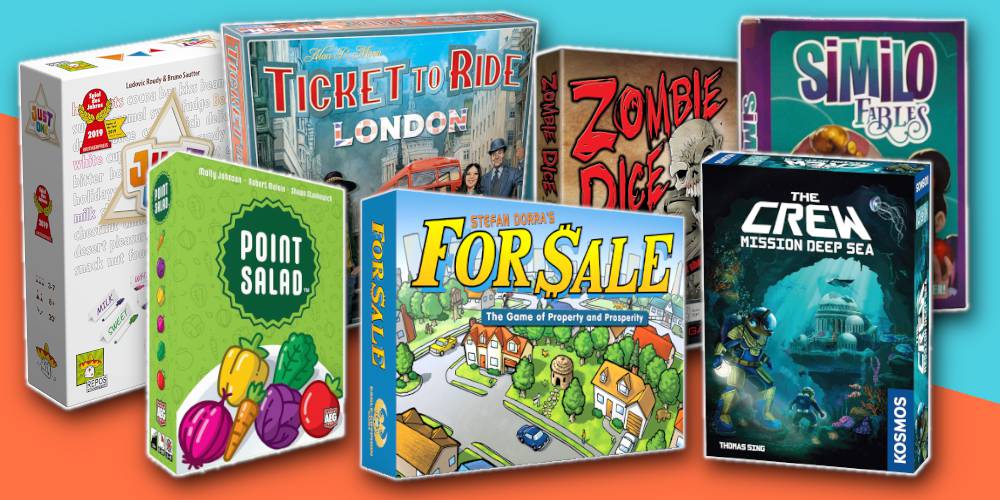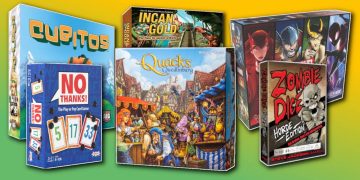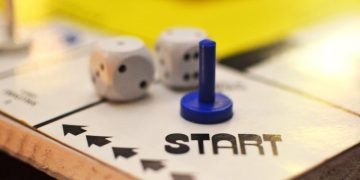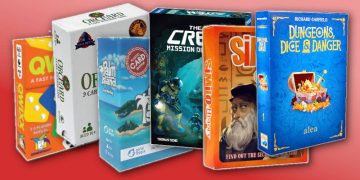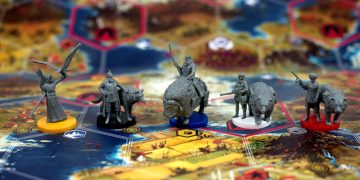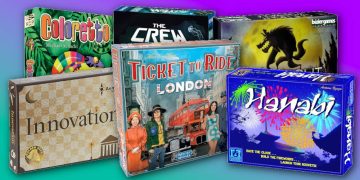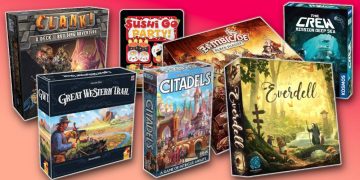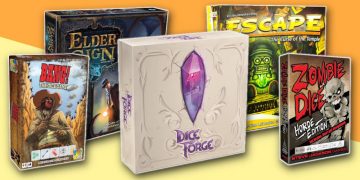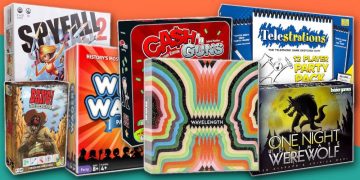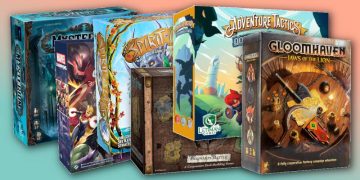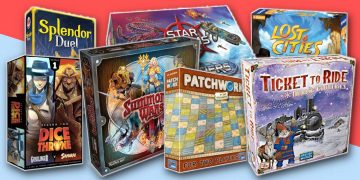Board games can be an incredibly fun way to get away from a screen for a while. It's just you, your friends, and the game.
But there is one area where video games often beat out board games: the ability to pick up and play without a huge time investment.
Many board games require a good chunk of time to set up, and then another big chunk of time to actually play, and then some more time to clean up and pack away! But that's not always the case.
Here are several great board, card, and dice games that are quick and playable in less than 30 minutes. Many are even shorter than that!
13. Zombie Dice: Horde Edition
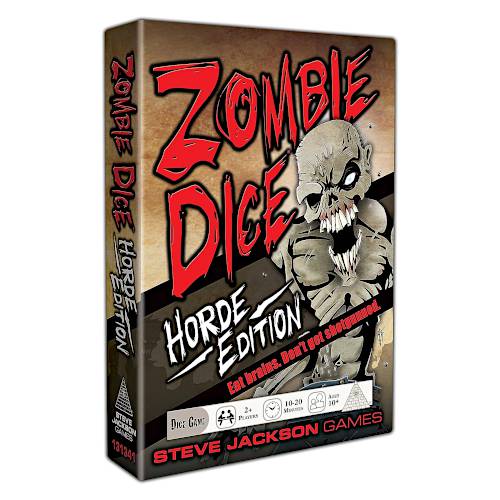
Zombie Dice is an extremely simple push-your-luck game that packs a lot of fun into such lightweight rules—and it involves nothing but a handful of custom dice, so it's extremely portable as well.
In Zombie Dice, on your turn, you roll three custom dice that can show either Brain, Footstep, or Shotgun: a Brain is worth 1 point, a Footstep can be re-rolled, a Shotgun ends your turn if you've rolled three of them.
When you're done, you can choose to take three more dice and continue rolling OR you can stop rolling and score what you've rolled. If you ever roll three Shotguns, your turn immediately ends and you lose all the Brains you rolled that turn, meaning zero points.
In other words, how many Brains can you roll before you roll three Shotguns? How far will you push your luck? Zombie Dice is fast and fun, making it a great filler for any group size.
Note: While base Zombie Dice is available on its own, Zombie Dice: Horde Edition includes two expansions that add more kinds of dice to shake things up. I recommend it.
12. No Thanks!
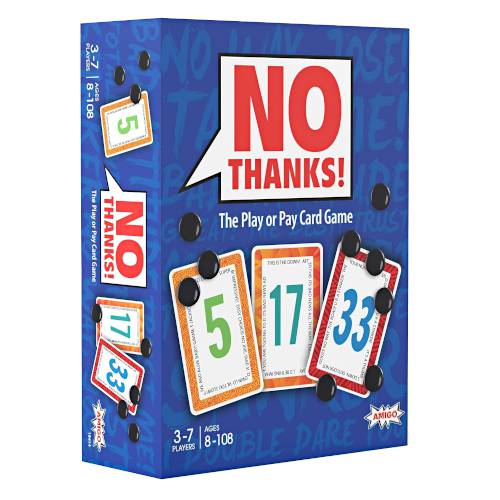
No Thanks! is a simple card game where you want as few points as possible. The deck consists of cards with point values from 3 to 35. Players also start with a handful of "refusal" chips.
Each round, one card is flipped over, then players take turns taking one of two possible actions: either place a refusal chip if they don't want the card, or take the card and all refusal chips that have accumulated on it. If you run out of chips, you must take the card.
When the deck runs out, whoever has the most points loses—and each chip you possess reduces your score by 1, so they're good to amass. But there are two more twists that really make No Thanks! shine.
If you collect a sequence of numbers (e.g. 24, 25, and 26), then the entire sequence is scored as the lowest value in the sequence (in this case, 24 points). Also, at the start of the game, nine cards are randomly removed from the deck, so the numbers you want may never show up.
No Thanks! is a fun blend of luck and strategy, where any given game may be decided by luck but the better player wins in the long run.
11. Similo
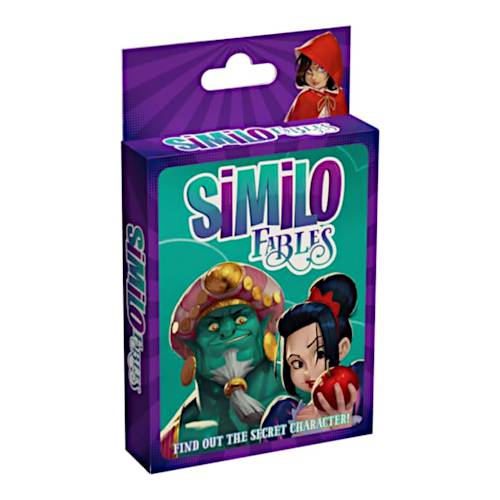
Designed by Martino Chiacchiera, Hjalmar Hach, and Pierluca Zizzi
Supports 2 to 8 players
About 10 to 15 minutes
Similo is a cooperative deduction game where one player is trying to get the other players to correctly guess a secret suspect from a grid of 4x3 cards, with each card representing one character.
On each round, the cluemaster plays a character card from their hand and states whether it's similar to or different from the secret suspect. Similarities and differences can be for any reason—maybe they both wear glasses, maybe they're opposite genders, maybe the cards share colors.
Using the given clue, players will choose to eliminate potential suspects from the grid. After five rounds, if the last remaining card is the secret suspect, then everyone wins.
Note: Similo is available in various theme packs. Each pack is playable on its own, but you can also mix packs together, using one for the characters and the other for giving clues.
The different theme packs include Similo: Fables, Similo: Myths, Similo: History, Similo: Animals, Similo: Wild Animals, Similo: Spookies, and Similo: Harry Potter.
10. Timeline
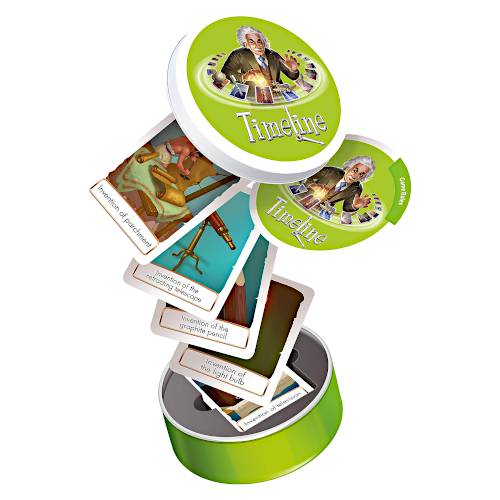
Timeline is a great card game for any collection because it's fast, it's simple, and it's educational—but not in a boring or stressful way.
Each player starts with a hand of four cards, with each card representing a particular event in time. For example, "Invention of the printing press," "First step on the moon," or "Discovery of planetary motion." On the back of each card is the year of that particular event.
Players take turns playing a card to a shared timeline, trying to place their event in the proper spot relative to the other events in the timeline.
If you get it right, it stays in the timeline; otherwise, the card is discarded and you draw another to your hand. The first player to get rid of all the cards in their hand wins.
The great thing about Timeline is that you don't need to know exact years to succeed. Since you only need to know how events relate to each other, you can reason your way to victory.
Note: Timeline is available in various theme packs. Each pack is playable on its own, but you can also mix packs together to spice up the game and make it more difficult.
The different theme packs include Timeline: Classic, Timeline: Inventions, Timeline: Events, and Timeline: British History.
9. Sushi Go Party!
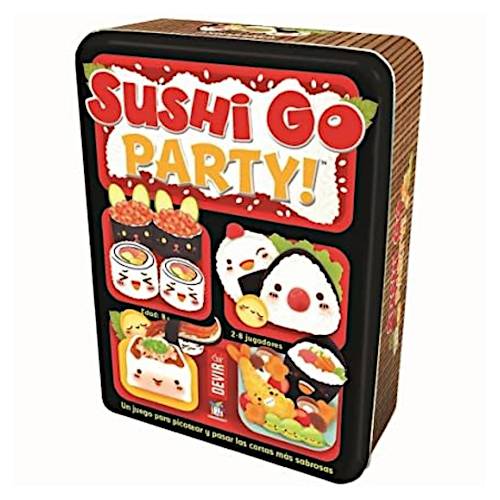
The original Sushi Go is a classic card game that uses a simplified card drafting system: everyone starts with a hand of cards, picks one card, then passes their hand to the left, which gives you a new hand of cards, from which you pick another card, then pass, then pick, etc.
There are various card types, which each have different scoring mechanisms. For example: nigiri cards have fixed point values, wasabi cards increase the value of nigiri cards, maki roll cards only grant points to whoever collects the most maki rolls, etc.
Sushi Go Party! is the definitive version of Sushi Go. It adds several more card types that expand gameplay, improve replayability, and increase the max number of players from five to eight.
Note: Sushi Go is best with five or more players. If you're mainly playing with 2 to 4 players, I recommend Sushi Roll instead.
Sushi Roll shares the same gameplay DNA as Sushi Go, but it uses dice and it has some twists that make it more strategic.
8. Point Salad
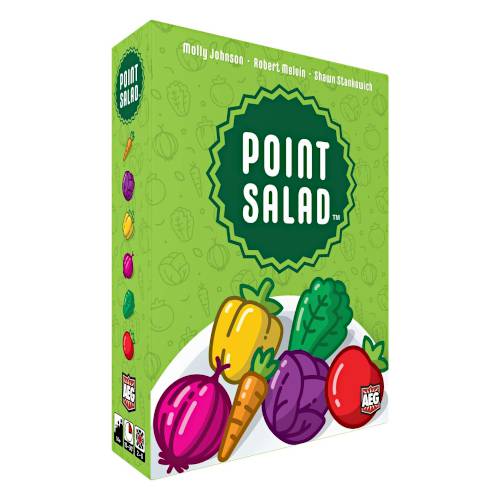
Designed by Molly Johnson, Robert Melvin, and Shawn Stankewich
Supports 2 to 6 players
About 15 to 30 minutes
Point Salad is a set collection card game where players take turns drafting vegetable cards from a shared pool. Here's the catch: the back of every vegetable card also has a unique scoring condition.
Throughout Point Salad, you aren't just drafting vegetable cards, but also flipping vegetable cards into scoring cards (or vice versa, flipping scoring cards into vegetable cards).
There are six vegetable types, but because each player has their own collection of scoring cards, the vegetables are worth different amounts to each player. There are over a hundred different ways to score.
When all the cards have been drafted, everyone tallies up their points based on their scoring cards, and whoever has the most wins.
7. Mint Works
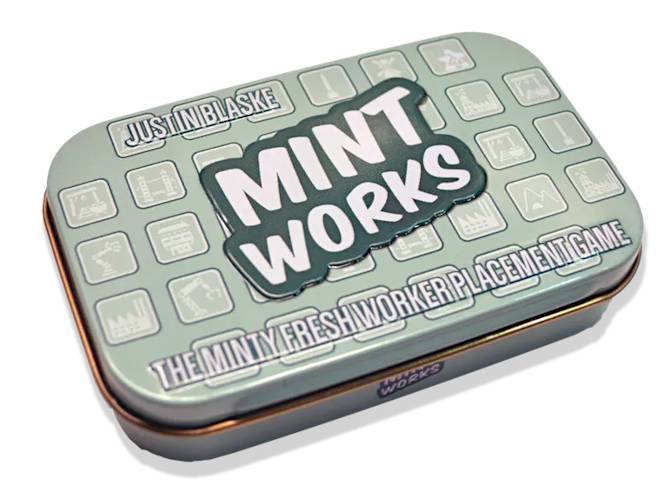
If you're looking for a meaty game that packs a serious punch in a 15-minute average play time, then Mint Works is the game for you.
Mint Works is a compact worker placement game, in which players place their "mint tokens" on different location cards to take a card's action.
Possible actions include gaining more mint tokens, acquiring plans, building acquired plans, exchanging plans, etc. The goal of the game is to earn points by building plans, and the first to earn seven points wins.
It sounds really simple—and it is!—but the structure of Mint Works means you'll be making lots of interesting decisions. In terms of ratio between depth and play time, few can beat Mint Works.
The cherry on top of it all is the game's packaging, which looks exactly like a tin of mints. It's extremely portable, meaning you can take this excellent game with you anywhere you go.
6. Love Letter
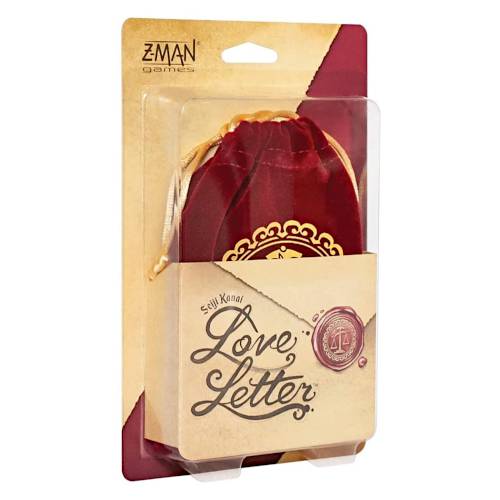
If you're looking for a lighthearted card game that blends simple hand management with a small dose of bluffing and deduction, then you absolutely have to try Love Letter.
Love Letter consists of 16 cards with face values 1 through 8. (The lower-value cards have multiple copies.) Players start with one card in their hand, and on their turn, they draw one card and play one card. That's it!
Each card, however, activates a special effect when played. For example, if you play the King, you must trade hands with someone. If you play the Guard, you pick someone and name a card—if they have it, they're eliminated. If you play the Princess, you're eliminated!
If everyone else gets eliminated, you win that round. If the deck runs out and there are multiple players still playing, the player with the highest-value card in their hand wins the round.
Each round of Love Letter only takes a few minutes to play. The goal is to be the first to win a certain number of rounds.
Love Letter is a true modern classic of card games that's perfect for so many occasions. It's fast, it's simple, it's engaging, and it's portable.
Note: While Love Letter is fine for 2 people, the game really kicks off with 3 players and truly shines with 4 players. It's still fun with just 2, but keep this in mind!
5. For Sale
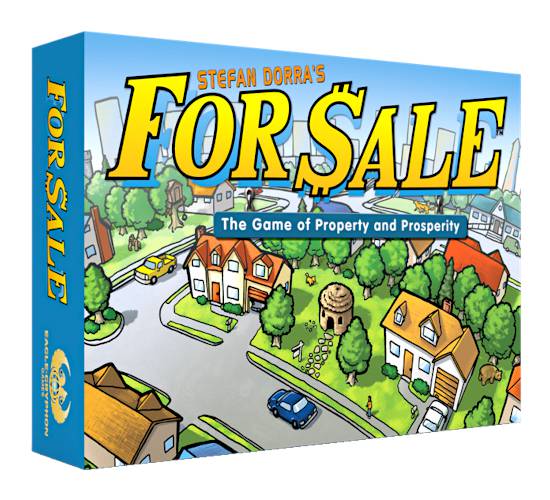
For Sale is the ultimate short-length auction game, in which players will be buying and selling real estate to become the richest player by the end.
In the first half of the game, all players start with the same amount of money. A set of property cards are flipped up in each round and players take turns making increasingly larger bids.
When a player wants to drop out of the present auction, they take the lowest-valued property card that's still remaining and then pay half of their current bid. The last person to drop out takes the highest-valued property card, but they pay their full bid amount.
When all property cards have been auctioned—there are 30 property cards, valued from 1 to 30—the selling phase of the game commences.
In the second half, a set of money cards are flipped up in each round and each player plays a property card in secret. They're all revealed, and players—in order of highest-valued property to lowest—get to choose which of the money cards they take.
For Sale is a lot simpler than it sounds and it plays a lot faster than you might expect. It's particularly good for groups of 4 to 6 players, and the two halves make for an entertaining rise of tension from start to end.
4. Fuse
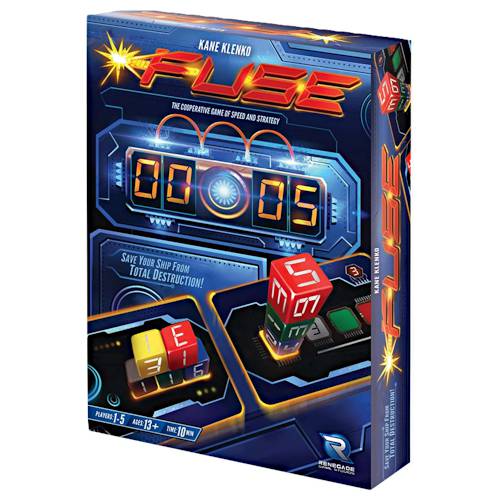
Fuse is a solid contender for greatest filler board game ever made, primarily for one reason: it always plays in 10 minutes, exactly.
That's because Fuse is a real-time cooperative dexterity game where players roll a bunch of dice, then take turns drafting those dice to solve their individual bomb cards.
There are 25 different dice in Fuse, five each of five different colors. The bomb cards have limitations on what kinds of dice can be placed on them, and some bomb cards are harder than other (e.g. one bomb card might require you to build a stack of dice in a very particular order).
And don't forget: Fuse is a real-time game. There's a countdown timer that ticks in the background, and you're all collaboratively trying to resolve all the bomb cards before time runs out.
It's a high-tension game that demands you make good decisions under time pressure. The fact that it has a fixed play time of 10 minutes ensures you can always slot this into whatever time gap you need to fill.
3. Just One
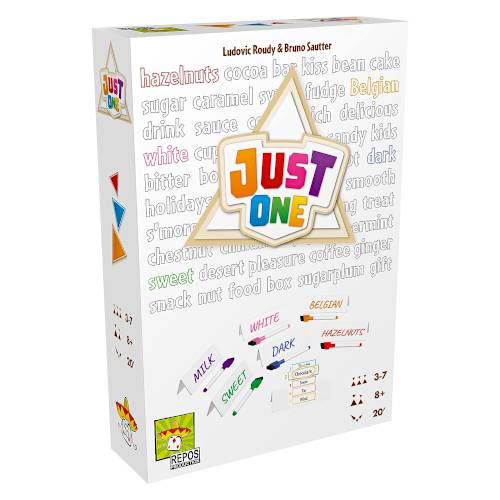
Designed by Ludovic Roudy and Bruno Sautter
Supports 3 to 7 players
About 15 to 30 minutes
Just One is one of my top picks for cooperative large-group party games, but it's also surprisingly solid at player counts as low as three!
In Just One, players take turns being the guesser. As guesser, you draw a card (without looking at it) and pick a number—that number determines which word on that card you'll need to guess. Everyone else secretly writes a one-word hint to help you guess the word in question.
The twist? When everyone's done, they reveal their hints to each other—and if any hint appears more than once, they all cancel out and can't be used. From the remaining hints, you'll need to guess the answer word.
Just One takes place over 13 cards, and the group is trying to succeed together on as many of those cards as they can. It plays fast and it's highly entertaining as players try to be helpful but not obvious.
2. The Crew: Mission Deep Sea
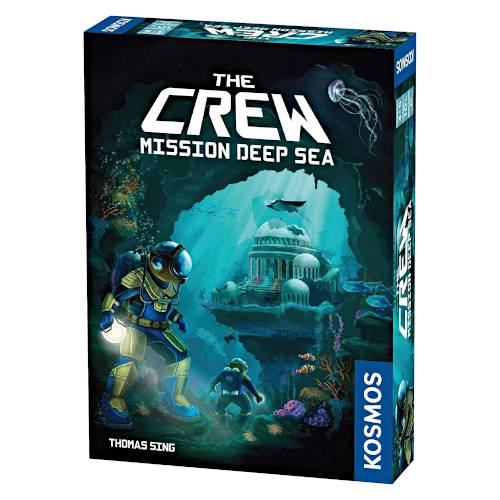
The Crew: Mission Deep Sea is the ultimate filler card game for groups who love trick-taking games—because this isn't just a trick-taking game, but a cooperative trick-taking game.
Every game of The Crew: Mission Deep Sea starts with a set of task cards that are distributed to players. These cards have goals for players, such as "Win the first three tricks" or "Win fewer tricks than everyone else."
If everyone can complete their task cards, everyone wins. But if even one player fails, it's failure for everyone.
The Crew: Mission Deep Sea also provides everyone with a communication token, which can be used to provide information about one card in their hand. Otherwise, no communication is allowed.
The best part? The task cards have different difficulty ratings on them, and you can adjust the difficulty of the game for your own group by changing the difficulty target, which changes the number of task cards in play.
Each hand of The Crew: Mission Deep Sea only takes 5 to 10 minutes, but it's so addictive. You'll want to play just one more hand, one more hand, one more hand... until the whole night passes you by.
1. Ticket to Ride: London
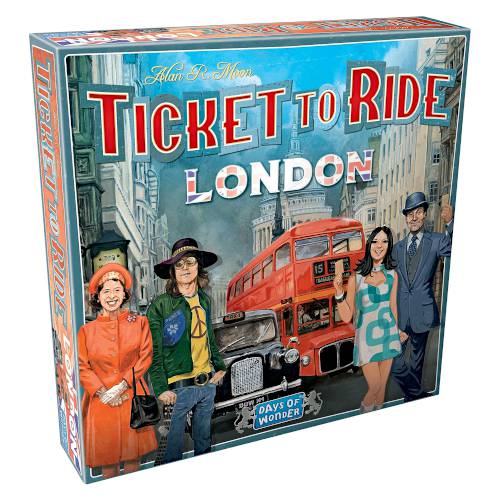
Ticket to Ride is one of the most popular board games in the entire world, with several variations released over the years that each introduce different gameplay elements that twist the game.
Well, Ticket to Ride: London is the express version of Ticket to Ride that distills the entire experience into a 15-minute play session.
The map is smaller and the routes are shorter, but the core gameplay is the same: collect cards, play those cards to build routes, and make sure your routes are connected to fulfill your destination tickets.
Ticket to Ride: London is the best way to enjoy Ticket to Ride if you prefer several short sessions versus one longer session, or if you mainly play with two or three players. Plus, it's extremely affordable!
